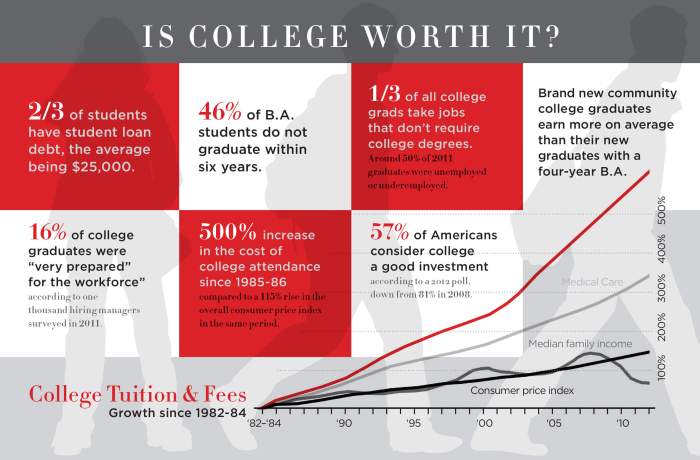Is college worth it dbq – Is college worth the investment? This is a question that has been debated for generations, and there is no easy answer. In this essay, we will explore the different perspectives on this issue, examining the potential benefits and drawbacks of a college education.
We will also provide data and examples to support our arguments.
There are many factors to consider when making a decision about whether or not to attend college. These include the cost of college, the potential return on investment, and the availability of alternative pathways to success. We will discuss each of these factors in detail, providing you with the information you need to make an informed decision.
Educational Attainment

The value of college education has been a subject of ongoing debate for decades. Historically, a college degree was seen as a gateway to better career opportunities and higher earning potential. However, in recent years, the rising cost of tuition and the increasing availability of alternative education pathways have led some to question whether college is still worth the investment.
There are two main perspectives on the relationship between college education and career success. The first view holds that a college degree is essential for obtaining a well-paying job in today’s competitive job market. Proponents of this view argue that college graduates have higher levels of knowledge and skills than those with only a high school diploma, and that they are therefore more likely to be hired for higher-level positions with higher salaries.
If you’re contemplating the value of higher education, it’s worth considering the complexities of the question “Is college worth it?” Exploring various perspectives can help you reach an informed decision. Take, for instance, the mathematical equation solve for f 6f 9g 3g f . Solving for f requires understanding the variables and their relationships, much like evaluating the pros and cons of college.
Ultimately, the decision of whether or not college is the right path for you remains a personal one, based on your goals and circumstances.
The second view argues that a college degree is not always necessary for career success. Proponents of this view point to the many successful individuals who have achieved great things without a college degree. They argue that skills, experience, and personal drive are often more important than a college diploma.
Correlation between College Degrees and Income Levels
There is a strong correlation between college degrees and income levels. According to the U.S. Bureau of Labor Statistics, workers with a bachelor’s degree earn on average 65% more than those with only a high school diploma. This gap has been growing wider in recent years, as the demand for college-educated workers has increased.
However, it is important to note that the correlation between college degrees and income levels does not necessarily mean that college is the only path to success. There are many other factors that can contribute to income levels, such as experience, skills, and personal drive.
Additionally, there are some college degrees that do not lead to high-paying jobs. Therefore, it is important to carefully consider your career goals and choose a college major that will prepare you for the job you want.
Career Opportunities

College graduates have access to a wide range of career opportunities that typically require a higher level of education and specialized skills. Industries such as healthcare, finance, engineering, and technology often seek individuals with college degrees.
Job Roles
College graduates can pursue diverse job roles within their chosen fields. For example, those with a degree in nursing can work as registered nurses, nurse practitioners, or nurse anesthetists. Business graduates can become accountants, financial analysts, or marketing managers. Engineers with college degrees can specialize in fields such as civil, mechanical, or electrical engineering.
Earning Potential
On average, college graduates earn significantly more than those with only a high school diploma. According to the U.S. Bureau of Labor Statistics, the median annual wage for workers with a bachelor’s degree is $65,660, compared to $41,950 for those with only a high school diploma.
Job Security, Is college worth it dbq
College graduates also tend to have higher job security compared to those with lower levels of education. During economic downturns, individuals with college degrees are less likely to lose their jobs or face salary cuts.
Personal Growth and Development

College is a transformative experience that extends beyond academic pursuits. It offers a fertile ground for personal growth and development, fostering intellectual exploration, critical thinking, and social interaction.Through coursework, research projects, and discussions, students delve into diverse fields of knowledge, broadening their perspectives and challenging their preconceptions.
This intellectual exploration nurtures curiosity, creativity, and a lifelong love for learning.
Critical Thinking and Problem-Solving
College cultivates critical thinking skills, teaching students to analyze information objectively, evaluate arguments, and draw informed conclusions. They learn to identify biases, question assumptions, and seek evidence to support their claims. These abilities are invaluable in navigating complex personal and professional situations.
Social Interaction and Diversity
College campuses are melting pots of cultures, perspectives, and backgrounds. Students interact with peers from different walks of life, fostering empathy, tolerance, and an appreciation for diversity. Through group projects, clubs, and social events, they develop interpersonal skills, learn to work effectively in teams, and build lasting relationships.
Personal Values and Perspectives
College experiences can profoundly shape personal values and perspectives. Exposure to new ideas, diverse cultures, and challenging situations prompts students to reflect on their own beliefs, values, and aspirations. They develop a deeper understanding of themselves, their strengths and weaknesses, and their place in the world.
Financial Considerations: Is College Worth It Dbq

College is a significant financial investment. It’s crucial to calculate the average cost of attending college, explore different financing options, and consider the potential return on investment (ROI) of a college degree. Various factors can affect the financial value of a college education, which we will discuss in this section.
Cost of College
- Tuition and fees: These vary widely depending on the institution, type of school (public or private), and program of study.
- Room and board: On-campus housing and meal plans can be expensive, especially in urban areas.
- Books and supplies: Textbooks, course materials, and other academic resources can add up.
- Transportation: Costs vary depending on the location of the college and the student’s transportation choices.
Financing Options
- Federal student loans: These offer low interest rates and flexible repayment options.
- Private student loans: These may have higher interest rates and less favorable terms.
- Scholarships and grants: These are free money that does not need to be repaid.
- Work-study programs: These allow students to earn money while attending college.
Return on Investment
The ROI of a college degree is complex and varies depending on factors such as:
- Major of study: Degrees in STEM fields tend to have higher earning potential.
- Job market: Economic conditions and industry trends can impact job availability and salaries.
- Location: Salaries and job opportunities can vary significantly across regions.
- Individual factors: Skills, experience, and networking also influence earning potential.
Alternative Pathways

While a college degree is often seen as the traditional path to career success, it is not the only option. There are numerous alternative pathways that can lead to fulfilling and lucrative careers without the need for a four-year degree.
These alternative pathways include vocational training, apprenticeships, and on-the-job experience. Each of these options has its own benefits and drawbacks, and the best choice for any individual will depend on their specific goals and circumstances.
Vocational Training
Vocational training programs provide students with the skills and knowledge they need to enter a specific trade or occupation. These programs are typically offered at community colleges, trade schools, or other vocational institutions.
The benefits of vocational training include the following:
- Shorter duration:Vocational training programs can often be completed in less time than a traditional college degree.
- Lower cost:Vocational training programs are typically less expensive than college.
- Hands-on experience:Vocational training programs provide students with hands-on experience in their chosen field, which can be valuable for employers.
However, there are also some drawbacks to vocational training, including the following:
- Limited career options:Vocational training programs typically prepare students for a specific trade or occupation, which can limit their career options in the future.
- Lower earning potential:On average, individuals with vocational training earn less than those with college degrees.
Apprenticeships
Apprenticeships are another alternative pathway to career success. Apprenticeships are typically offered by employers and involve a combination of on-the-job training and classroom instruction.
The benefits of apprenticeships include the following:
- Earn while you learn:Apprentices are paid while they learn, which can help them offset the cost of training.
- Hands-on experience:Apprenticeships provide students with hands-on experience in their chosen field, which can be valuable for employers.
- Higher earning potential:On average, individuals with apprenticeships earn more than those with vocational training.
However, there are also some drawbacks to apprenticeships, including the following:
- Limited availability:Apprenticeships are not available in all fields, and they can be competitive to get into.
- Long duration:Apprenticeships can take several years to complete.
On-the-Job Experience
On-the-job experience is another alternative pathway to career success. On-the-job experience can be gained through internships, part-time jobs, or volunteer work.
The benefits of on-the-job experience include the following:
- Real-world experience:On-the-job experience provides students with real-world experience in their chosen field, which can be valuable for employers.
- Networking opportunities:On-the-job experience can help students build a network of contacts in their field.
- Higher earning potential:On average, individuals with on-the-job experience earn more than those with no experience.
However, there are also some drawbacks to on-the-job experience, including the following:
- Limited opportunities:On-the-job experience opportunities may be limited, especially in competitive fields.
- Low pay:On-the-job experience often pays less than other alternative pathways.
Potential Earning Power
The potential earning power of individuals with non-traditional educational backgrounds varies depending on the field and the individual’s experience and skills.
For example, according to the Bureau of Labor Statistics, the median annual salary for electricians is $56,900. Electricians typically complete a four-year apprenticeship program.
According to the same source, the median annual salary for plumbers is $56,330. Plumbers typically complete a four-year apprenticeship program.
According to the National Center for Education Statistics, the median annual salary for individuals with an associate’s degree is $48,000. Individuals with an associate’s degree typically complete a two-year program at a community college or trade school.
It is important to note that these are just a few examples, and the potential earning power of individuals with non-traditional educational backgrounds can vary widely depending on the field and the individual’s experience and skills.
Question Bank
Is college worth the cost?
The cost of college has been rising steadily for decades, and this has led many people to question whether or not it is still worth the investment. There is no easy answer to this question, as it depends on a number of factors, including the cost of the college you attend, the major you choose, and your career goals.
However, there is some evidence to suggest that a college education can still lead to a higher income and better job opportunities.
What is the return on investment for a college degree?
The return on investment (ROI) for a college degree is the amount of money you can expect to earn over your lifetime with a college degree, compared to what you would earn with only a high school diploma. The ROI for a college degree varies depending on the major you choose, but it is generally positive.
For example, a study by the Georgetown University Center on Education and the Workforce found that workers with a bachelor’s degree earn an average of $1 million more over their lifetime than workers with only a high school diploma.
Are there any alternative pathways to success that do not require a college degree?
There are a number of alternative pathways to success that do not require a college degree. These include vocational training, apprenticeships, and on-the-job experience. These pathways can lead to good-paying jobs in a variety of fields, such as construction, manufacturing, and healthcare.


